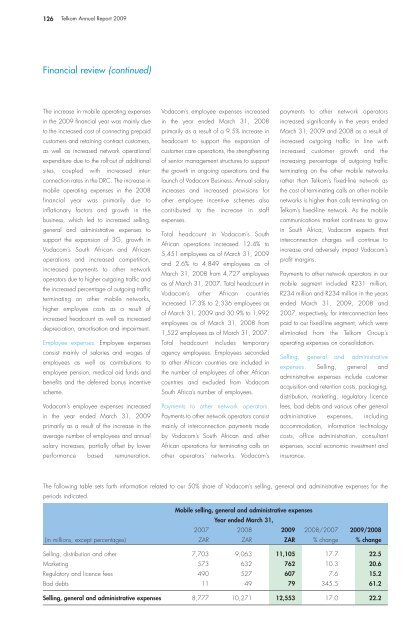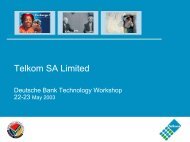Telkom AR front.qxp
Telkom AR front.qxp
Telkom AR front.qxp
Create successful ePaper yourself
Turn your PDF publications into a flip-book with our unique Google optimized e-Paper software.
126<br />
<strong>Telkom</strong> Annual Report 2009<br />
Financial review (continued)<br />
The increase in mobile operating expenses<br />
in the 2009 financial year was mainly due<br />
to the increased cost of connecting prepaid<br />
customers and retaining contract customers,<br />
as well as increased network operational<br />
expenditure due to the roll-out of additional<br />
sites, coupled with increased interconnection<br />
rates in the DRC. The increase in<br />
mobile operating expenses in the 2008<br />
financial year was primarily due to<br />
inflationary factors and growth in the<br />
business, which led to increased selling,<br />
general and administrative expenses to<br />
support the expansion of 3G, growth in<br />
Vodacom’s South African and African<br />
operations and increased competition,<br />
increased payments to other network<br />
operators due to higher outgoing traffic and<br />
the increased percentage of outgoing traffic<br />
terminating on other mobile networks,<br />
higher employee costs as a result of<br />
increased headcount as well as increased<br />
depreciation, amortisation and impairment.<br />
Employee expenses. Employee expenses<br />
consist mainly of salaries and wages of<br />
employees as well as contributions to<br />
employee pension, medical aid funds and<br />
benefits and the deferred bonus incentive<br />
scheme.<br />
Vodacom’s employee expenses increased<br />
in the year ended March 31, 2009<br />
primarily as a result of the increase in the<br />
average number of employees and annual<br />
salary increases, partially offset by lower<br />
performance based remuneration.<br />
Vodacom’s employee expenses increased<br />
in the year ended March 31, 2008<br />
primarily as a result of a 9.5% increase in<br />
headcount to support the expansion of<br />
customer care operations, the strengthening<br />
of senior management structures to support<br />
the growth in ongoing operations and the<br />
launch of Vodacom Business. Annual salary<br />
increases and increased provisions for<br />
other employee incentive schemes also<br />
contributed to the increase in staff<br />
expenses.<br />
Total headcount in Vodacom’s South<br />
African operations increased 12.4% to<br />
5,451 employees as of March 31, 2009<br />
and 2.6% to 4,849 employees as of<br />
March 31, 2008 from 4,727 employees<br />
as of March 31, 2007. Total headcount in<br />
Vodacom’s other African countries<br />
increased 17.3% to 2,336 employees as<br />
of March 31, 2009 and 30.9% to 1,992<br />
employees as of March 31, 2008 from<br />
1,522 employees as of March 31, 2007.<br />
Total headcount includes temporary<br />
agency employees. Employees seconded<br />
to other African countries are included in<br />
the number of employees of other African<br />
countries and excluded from Vodacom<br />
South Africa’s number of employees.<br />
Payments to other network operators.<br />
Payments to other network operators consist<br />
mainly of interconnection payments made<br />
by Vodacom’s South African and other<br />
African operations for terminating calls on<br />
other operators’ networks. Vodacom’s<br />
payments to other network operators<br />
increased significantly in the years ended<br />
March 31, 2009 and 2008 as a result of<br />
increased outgoing traffic in line with<br />
increased customer growth and the<br />
increasing percentage of outgoing traffic<br />
terminating on the other mobile networks<br />
rather than <strong>Telkom</strong>’s fixed-line network as<br />
the cost of terminating calls on other mobile<br />
networks is higher than calls terminating on<br />
<strong>Telkom</strong>’s fixed-line network. As the mobile<br />
communications market continues to grow<br />
in South Africa, Vodacom expects that<br />
interconnection charges will continue to<br />
increase and adversely impact Vodacom’s<br />
profit margins.<br />
Payments to other network operators in our<br />
mobile segment included R231 million,<br />
R234 million and R234 million in the years<br />
ended March 31, 2009, 2008 and<br />
2007, respectively, for interconnection fees<br />
paid to our fixed-line segment, which were<br />
eliminated from the <strong>Telkom</strong> Group’s<br />
operating expenses on consolidation.<br />
Selling, general and administrative<br />
expenses. Selling, general and<br />
administrative expenses include customer<br />
acquisition and retention costs, packaging,<br />
distribution, marketing, regulatory licence<br />
fees, bad debts and various other general<br />
administrative expenses, including<br />
accommodation, information technology<br />
costs, office administration, consultant<br />
expenses, social economic investment and<br />
insurance.<br />
The following table sets forth information related to our 50% share of Vodacom’s selling, general and administrative expenses for the<br />
periods indicated.<br />
Mobile selling, general and administrative expenses<br />
Year ended March 31,<br />
2007 2008 2009 2008/2007 2009/2008<br />
(in millions, except percentages) Z<strong>AR</strong> Z<strong>AR</strong> Z<strong>AR</strong> % change % change<br />
Selling, distribution and other 7,703 9,063 11,105 17.7 22.5<br />
Marketing 573 632 762 10.3 20.6<br />
Regulatory and licence fees 490 527 607 7.6 15.2<br />
Bad debts 11 49 79 345.5 61.2<br />
Selling, general and administrative expenses 8,777 10,271 12,553 17.0 22.2




